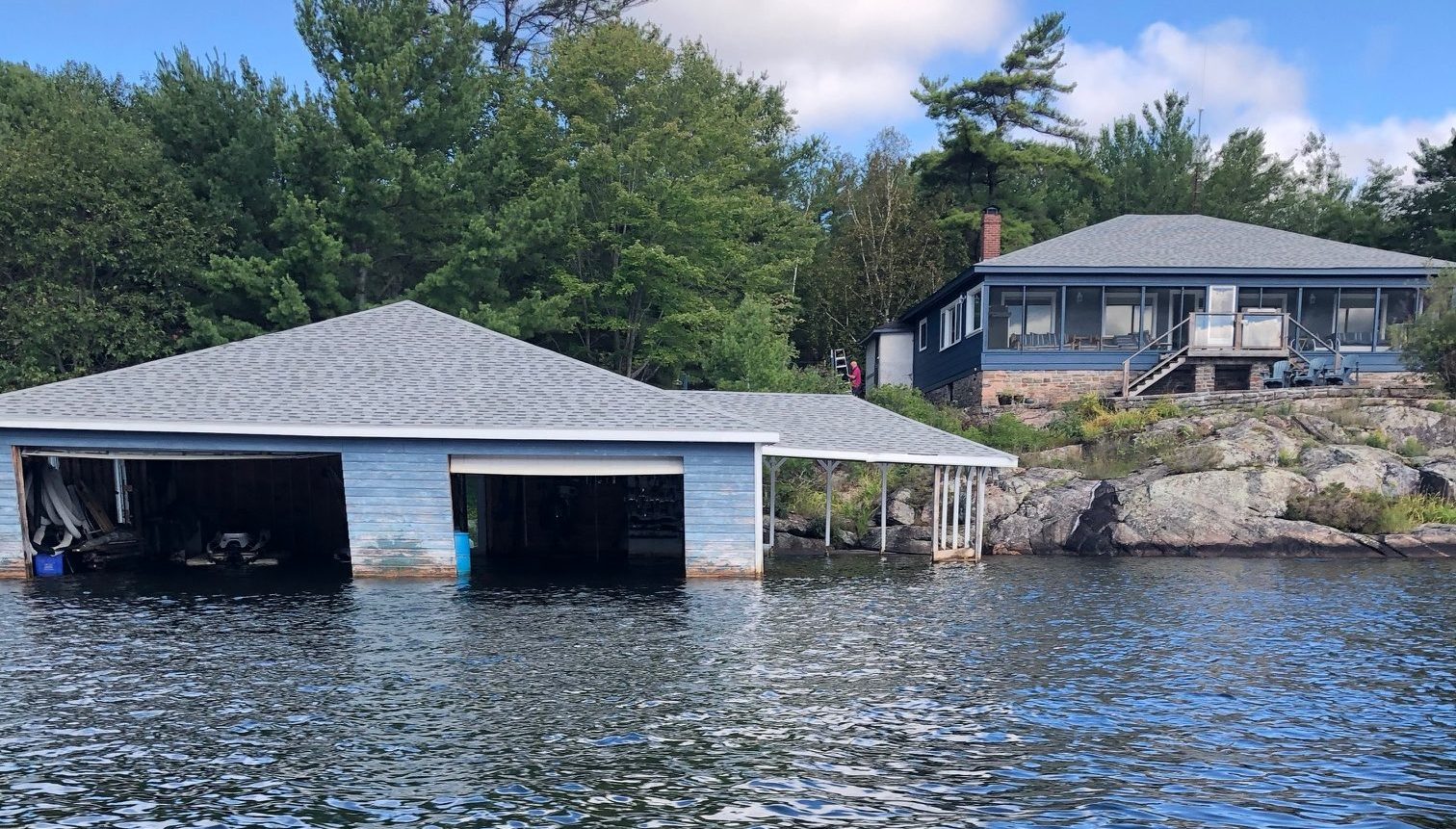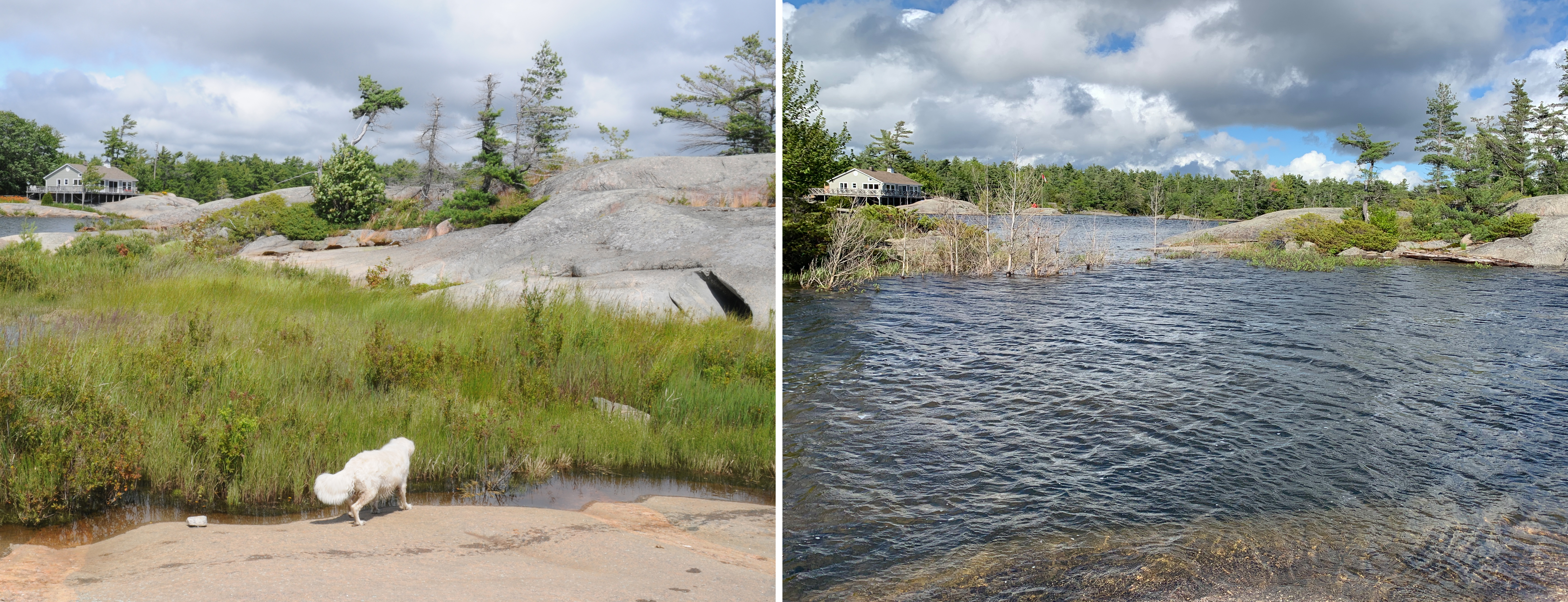
Record high-highs and low-lows. What do we know?
On October 24, 2020 GBA and Georgian Bay Forever (GBF) brought together leading scientists, engineers, academics and policy makers to lay the facts on the table about high water levels in the Great Lakes. Over 700 people registered for this inaugural online event with 432 in attendance.
For a brief overview of the primary issues and action plan, featuring the Top 10 questions and Key Takeaways, see: Water Levels Web Symposium Summary.
Slide presentations from the acknowledged academics and institutional experts can be found here:
- Water Levels Symposium 2020 Slide Presentations – Morning Session
- Water Levels Symposium 2020 Slide Presentation – Afternoon Session
Explore the detailed results of this successful joint venture with Georgian Bay Forever (GBF). Find out about:
- Future water levels – what to expect and why;
- The wider range of water level fluctuations on Lake Michigan-Huron compared to Lake Superior – the real reason for this difference;
- Plan 2012 – positive action that has helped mitigate our high water levels in the Bay – what has been done and how it works; and
- Much, much more.
If you want to take a deep dive into the symposium’s presentations and discussions go to: Water Levels Web Symposium Synopsis; and to find answers to all 259 questions we received, have a look at: Water Levels Web Symposium Questions & Answers.
Next Steps
GBA and GBF will be following up on a wide range of water levels related action items that came out of the symposium.
In the short term we can improve our knowledge about what is going on in the Great Lakes system and ensure that the best job possible is done to mitigate extreme high and low levels by using the current tools available.
However, discussions also need to begin on: longer term solutions to expand upon the available tools we have and apply emerging technologies to address the expected increase in water levels volatility; and reaching consensus amongst all stakeholders on what can and should be done.

The Questions Posed
Jointly chaired by GBF Executive Director, David Sweetnam, and GBA Executive Director, Rupert Kindersley, our symposium asked the experts for their takes on key water level issues.
The morning session focused on four questions:
- What’s known and not known about water-level fluctuation cycles?
- What’s known and not known about water levels control structures?
- Do we have all the data we need to understand water levels and, if not, what data and data-collection approaches should be prioritized?
- How can existing and to-be-collected data be converted to a consistent format and presented to better inform decision-making?
The afternoon session focused on two questions:
- What improvements could be made to coordination between control boards and their coordination with other water levels control structures in the system to better address extreme high and low water levels?
- Is there consensus on action that could be taken to improve coordination and ensure that we collectively use all available methods to mitigate future extreme high and low water levels?
Our Incredible Panel of Experts
We were privileged to have top professionals in the field share their expertise and answer questions. Our accomplished panel consisted of:
-
- John Allis – Chief, Great Lakes Hydraulics and Hydrology Office, with the United States Army Corps of Engineers (USACE), Detroit District. John’s office is responsible for monitoring and forecasting water levels on the Great Lakes and monitoring hydraulic and hydrologic conditions throughout the Great Lakes basin. John also holds several roles supporting the International Joint Commission (IJC) and other international water management activities as the US Co-Chair for the Great Lakes-St. Lawrence River Adaptive Management Committee (GLAM) and the US Co-Chair for the Coordinating Committee.
- Pierre Béland – Canadian Section Chair of the International Joint Commission (IJC). Dr. Béland is a scientist in environmental biology and toxicology, best known as an expert on the conservation of beluga whales and was a founder and research scientist with the St. Lawrence National Institute of Ecotoxicology. He has served for ten years as a Commissioner for BAPE (Office of Public Hearings on the Environment in Quebec) and previously headed the Fisheries Ecology Research Center with the Department of Fisheries and Oceans Canada.
- Rob Caldwell – Canadian Secretary, Control Boards with the IJC and Environment and Climate Change Canada’s (ECCC) Great Lakes–St. Lawrence Regulation Office. Rob is an engineer and also a committee member of GLAM and Canadian Co-Chair of the Coordinating Committee on Great Lakes Basic Hydraulic and Hydrologic Data.
- Drew Gronewold – Associate Professor Conservation Ecology, Climate, Energy & Water at the University of Michigan. Prior to joining the University of Michigan, Dr. Gronewold was the lead hydrologist at the National Oceanic and Atmospheric Administration (NOAA) Great Lakes Environmental Research Laboratory, where his team advanced research on the Great Lakes hydrologic cycle and on historical and future water levels.
- Erika Klyszejko – Engineering Advisor with the Canadian Section of the International Joint Commission (IJC). She also acts as a liaison to the International Lake Superior Board of Control, the International Niagara Board of Control, the International Lake Ontario – St. Lawrence River Board, and GLAM.
- Rick Layzell – Chief Executive Officer of Boating Ontario. Rick has been in the marine industry for over 30 years with Grew Boats, Yamaha Motor Canada, Gordon Bay Marine, and MD Marine Insurance. Boating Ontario represents over 530 member companies across the province serving every facet of the recreational boating industry.
- Wendy Leger – Senior Physical Science Officer and Head of the Boundary Waters Issues Unit with the National Hydrological Service of Canada within ECCC. Wendy has spent much of her 30 year career working on large multi-disciplinary and multi-jurisdictional water resource management projects in the Great Lakes-St. Lawrence River Basin, bridging science and policy.
- Frank Seglenieks – Water Resources Engineer with the National Hydrological Service of Canada within Environment and Climate Change Canada (ECCC). His research interests are in hydrological modelling of the Great Lakes for the past, present, and future. Dr. Seglenieks is also a member of the Coordinating Committee and IJC GLAM Committee.
Remarks and introductions were made by:
-
- Elder Marilyn Capreol is Anishinaabe from Shawanaga First Nation in Ontario and is a founding member of the Conservation through Reconciliation Partnership Elder’s Lodge
- The Honourable Jonathan Wilkinson – Minister of Environment and Climate Change Canada
- Terry Duguid, Parliamentary Secretary to the Minister of Environment and Climate Change Canada
- Gord Walker, Q.C. – Former Canadian Section Chair & Commissioner of the IJC
- John Carson, President of GBA and Adam Chamberlain, Chair of Georgian Bay Forever
Water Levels 101
Need some background on water levels and their drivers? We recommend the following materials:
Overview
- Water Levels, What’s Going On? – presented by David Sweetnam, Georgian Bay Forever
Global Warming
- Above Average: Great Lakes water temperatures keep high after record-breaking July – Great Lakes Now
- The Importance of Ground Water in the Great Lakes Region – U.S. Geological Survey
Coastal Processes
- Coastal Processes (excerpts from the publication entitled “Living on the Coast”) – US Army Corp of Engineers
